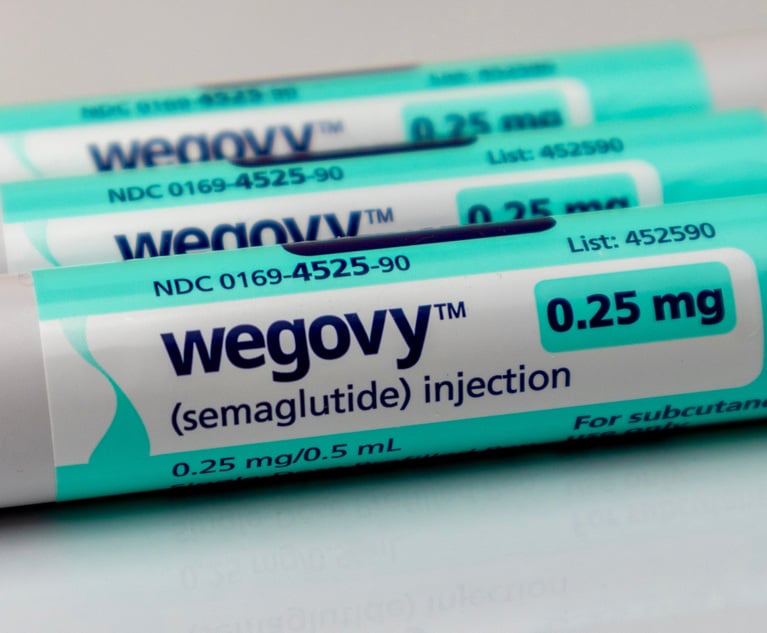Federal Circuit Flattens Bayer Patent on Erectile Dysfunction Drug
In a win for Goodwin Procter, a unanimous panel ruled Wednesday that a patent covering Bayer's Staxyn is obvious in light of numerous previous patent applications and medical journal articles. The decision reverses U.S. District Judge Gregory Sleet of Delaware.
November 01, 2017 at 06:14 PM
3 minute read
The original version of this story was published on Delaware Law Weekly

The U.S. Court of Appeals for the Federal Circuit has let the air out of a Bayer Pharma AG erectile dysfunction drug.
A unanimous panel ruled Wednesday that a patent covering Bayer's orally disintegrating version of Levitra is obvious in light of numerous previous patent applications and medical journal articles.
The decision reversed a ruling by U.S. District Judge Gregory Sleet of the District of Delaware, who had found following a six-day bench trial that the prior art “teaches away” from Bayer's orally disintegrating formulation, known as Staxyn.
“We hold the district court clearly erred in finding a skilled artisan would not have been motivated to use the claim elements,” Judge Kimberly Moore wrote for the court. Judges Alan Lourie and Kathleen O'Malley concurred.
Bayer v. Watson is a win for Goodwin Procter partner William Jay, who argued the appeal for Teva Pharmaceutical Industries Ltd., which owns the named parties Watson Laboratories Inc. and Actavis Pharma Inc. Williams & Connolly partner David Berl argued for Bayer.
Levitra is a phosphodiesterase inhibitor similar to Viagra and Cialis, the two leading ED drugs on the market. Patents on all three are nearing expiration.
Bayer patented Staxyn, which combines Levitra's active ingredient with mannitol and sorbitol, in 2013.
Bayer argued, and Sleet agreed, that other manufacturers would not have been motivated to combine the ingredients. Pfizer Inc. had announced plans to launch an orally dissolving version of Viagra in 1998, but had not brought the patent to market by 2005, when Bayer applied for the Staxyn patent. And Levitra's active ingredient, vardenafil hydrochloride trihydrate, has a bitter, unpleasant taste.
Moore ruled that is not enough to defeat a claim for obviousness, especially given all the literature available in 2005 about orally dissolving ED drugs.
“The motivation to combine inquiry is not limited to what products are forthcoming or currently available on the market,” Moore wrote. “Particularly given the lengthy FDA approval process, the pharmaceutical industry is no exception.”
Moore added that Sleet overlooked a sorbitol-based excipient that was advertised at the time as “impart[ing] a sweet taste and a unique texture to the mannitol, thereby improving the ODT formulation's mouthfeel.”
This content has been archived. It is available through our partners, LexisNexis® and Bloomberg Law.
To view this content, please continue to their sites.
Not a Lexis Subscriber?
Subscribe Now
Not a Bloomberg Law Subscriber?
Subscribe Now
NOT FOR REPRINT
© 2024 ALM Global, LLC, All Rights Reserved. Request academic re-use from www.copyright.com. All other uses, submit a request to [email protected]. For more information visit Asset & Logo Licensing.
You Might Like
View All
Novo Nordisk Files Patent Claims to Fend off Generic Rivals of Wegovy
3 minute read
Amazon Faces Similar Patent Suit Over Alexa, Echo Technology After $46.7M Jury Verdict Against It
3 minute read
This Company, Recently Former In Delaware, Just Unleashed a Slew of Suits Against IBM, Sony, Microsoft, 5 Others
3 minute readTrending Stories
- 1Infant Formula Judge Sanctions Kirkland's Jim Hurst: 'Overtly Crossed the Lines'
- 2Abbott, Mead Johnson Win Defense Verdict Over Preemie Infant Formula
- 3Preparing Your Law Firm for 2025: Smart Ways to Embrace AI & Other Technologies
- 4Greenberg Traurig Initiates String of Suits Following JPMorgan Chase's 'Infinite Money Glitch'
- 5Data-Driven Legal Strategies
Who Got The Work
Michael G. Bongiorno, Andrew Scott Dulberg and Elizabeth E. Driscoll from Wilmer Cutler Pickering Hale and Dorr have stepped in to represent Symbotic Inc., an A.I.-enabled technology platform that focuses on increasing supply chain efficiency, and other defendants in a pending shareholder derivative lawsuit. The case, filed Oct. 2 in Massachusetts District Court by the Brown Law Firm on behalf of Stephen Austen, accuses certain officers and directors of misleading investors in regard to Symbotic's potential for margin growth by failing to disclose that the company was not equipped to timely deploy its systems or manage expenses through project delays. The case, assigned to U.S. District Judge Nathaniel M. Gorton, is 1:24-cv-12522, Austen v. Cohen et al.
Who Got The Work
Edmund Polubinski and Marie Killmond of Davis Polk & Wardwell have entered appearances for data platform software development company MongoDB and other defendants in a pending shareholder derivative lawsuit. The action, filed Oct. 7 in New York Southern District Court by the Brown Law Firm, accuses the company's directors and/or officers of falsely expressing confidence in the company’s restructuring of its sales incentive plan and downplaying the severity of decreases in its upfront commitments. The case is 1:24-cv-07594, Roy v. Ittycheria et al.
Who Got The Work
Amy O. Bruchs and Kurt F. Ellison of Michael Best & Friedrich have entered appearances for Epic Systems Corp. in a pending employment discrimination lawsuit. The suit was filed Sept. 7 in Wisconsin Western District Court by Levine Eisberner LLC and Siri & Glimstad on behalf of a project manager who claims that he was wrongfully terminated after applying for a religious exemption to the defendant's COVID-19 vaccine mandate. The case, assigned to U.S. Magistrate Judge Anita Marie Boor, is 3:24-cv-00630, Secker, Nathan v. Epic Systems Corporation.
Who Got The Work
David X. Sullivan, Thomas J. Finn and Gregory A. Hall from McCarter & English have entered appearances for Sunrun Installation Services in a pending civil rights lawsuit. The complaint was filed Sept. 4 in Connecticut District Court by attorney Robert M. Berke on behalf of former employee George Edward Steins, who was arrested and charged with employing an unregistered home improvement salesperson. The complaint alleges that had Sunrun informed the Connecticut Department of Consumer Protection that the plaintiff's employment had ended in 2017 and that he no longer held Sunrun's home improvement contractor license, he would not have been hit with charges, which were dismissed in May 2024. The case, assigned to U.S. District Judge Jeffrey A. Meyer, is 3:24-cv-01423, Steins v. Sunrun, Inc. et al.
Who Got The Work
Greenberg Traurig shareholder Joshua L. Raskin has entered an appearance for boohoo.com UK Ltd. in a pending patent infringement lawsuit. The suit, filed Sept. 3 in Texas Eastern District Court by Rozier Hardt McDonough on behalf of Alto Dynamics, asserts five patents related to an online shopping platform. The case, assigned to U.S. District Judge Rodney Gilstrap, is 2:24-cv-00719, Alto Dynamics, LLC v. boohoo.com UK Limited.
Featured Firms
Law Offices of Gary Martin Hays & Associates, P.C.
(470) 294-1674
Law Offices of Mark E. Salomone
(857) 444-6468
Smith & Hassler
(713) 739-1250







